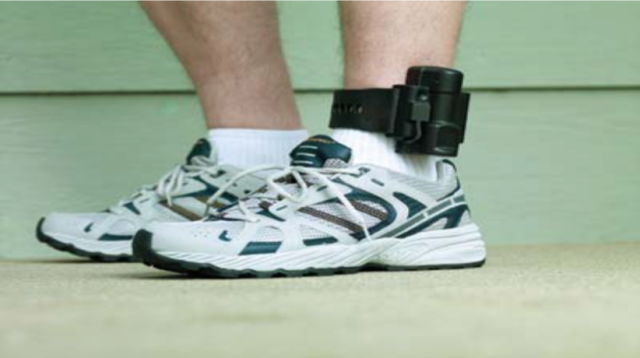
A federal appeals court is upholding lifetime GPS monitoring of a convicted felon, in this instance a Wisconsin pedophile who served time for sexually assaulting a boy and a girl. The court upheld the constitutionality of a Wisconsin law that, beginning in 2008, requires convicted pedophiles to wear GPS ankle devices for the rest of their lives.
A federal judge had sided with the offender, Michael Belleau, now 72. Wisconsin appealed to the 7th US Circuit Court of Appeals, which ruled (PDF) in the state's favor Friday and derided the lower court's ruling as "absurd." Among other things, Belleau said the GPS device violated his privacy because he had served his time and was not on post-prison supervision. The three-judge appeals court did not agree, saying:
When the ankleted person is wearing trousers the anklet is visible only if he sits down and his trousers hike up several inches and as a result no longer cover it. The plaintiff complains that when this happens in the presence of other people and they spot the anklet, his privacy is invaded, in violation of the Fourth Amendment, because the viewers assume that he is a criminal and decide to shun him. Of course the Fourth Amendment does not mention privacy or create any right of privacy. It requires that searches be reasonable but does not require a warrant or other formality designed to balance investigative need against a desire for privacy; the only reference to warrants is a prohibition of general warrants.
The court's reasoning, however, could apply to other criminals who have a propensity to reoffend. The court said that the burden on privacy "must in any event be balanced against the gain to society from requiring that the anklet monitor be worn. It is because of the need for such balancing that persons convicted of crimes, especially very serious crimes such as sexual offenses against minors, and especially very serious crimes that have high rates of recidivism such as sex crimes, have a diminished reasonable constitutionally protected expectation of privacy."
The anklet is waterproof to 15 feet, can be worn while bathing, and must be plugged into an outlet for an hour each day to recharge it. There are no travel restrictions as long as he has access to an electrical outlet. Each night, state corrections officials map out the defendant's whereabouts that day, the court said, "so that should he be present at a place where a sex crime has been committed, or be hanging around school playgrounds or otherwise showing an abnormal interest in children not his own, the police will be alerted to the need to conduct an investigation."
The Supreme Court has never directly ruled on the issue of whether lifetime GPS monitoring is constitutional. But last year, the high court questioned a similar North Carolina law without ruling on the issue.
The Chicago-based appeals court, meanwhile, said Belleau's privacy interest was also diminished because his criminal record is on the Internet. The court said:
The focus must moreover be on the incremental effect of the challenged statute on the plaintiff’s privacy, and that effect is slight given the decision by Wisconsin—which he does not challenge—to make sex offenders’ criminal records and home addresses public. These records are downloaded by private websites such as Family Watchdog that enable anyone with access to the Internet to determine whether a sex offender—more precisely anyone who has ever been convicted of a sexual offense serious enough to be made public by the state—lives near him. One of the members of this appellate panel, out of curiosity stimulated by another sex offender privacy case, visited Family Watchdog and learned that there were several (one hopes reformed—but it is only a hope) sex offenders living on his street.
The court poked fun at the Electronic Frontier Foundation, which urged the court to rule against GPS lifetime monitoring.
"For it's not as if the Department of Corrections were following the plaintiff around, peeking through his bedroom window, trailing him as he walks to the drug store or the local Starbucks, videotaping his every move, and through such snooping learning (as the amicus curiae brief of the Electronic Frontier Foundation would have it), 'whether he is a weekly church goer, a heavy drinker, a regular at the gym, an unfaithful husband,' etc. (quoting United States v. Maynard, 615 F.3d 544, 562 (D.C. Cir. 2010)," the court ruled.
The court noted that GPS use on sex offenders in California found (PDF) that those required to wear monitors were half as likely to be arrested or convicted of a new sex offense than those without monitors.
"There is no reason to think that GPS monitoring of convicted child molesters in Wisconsin is any less efficacious," the three-judge court ruled unanimously.
reader comments
127